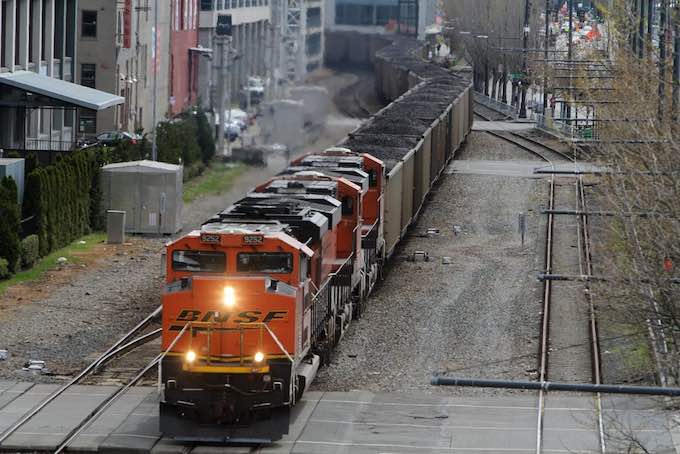forum
library
tutorial
contact

Environmentalists Sue BNSF to Cover
Coal Trains, Prevent Water Pollution
by Lynda V. Mapes
Seattle Times, November 7, 2016
|
the film forum library tutorial contact |

|
Environmentalists Sue BNSF to Cover
by Lynda V. Mapes
|
In Seattle in a case with national implications, environmentalists seek to force BNSF to cover coal-train loads.
 The trial in a lawsuit by a broad coalition of environmental groups seeking to force BNSF to cover its coal-train loads to prevent water pollution began Monday in federal court in Seattle.
The trial in a lawsuit by a broad coalition of environmental groups seeking to force BNSF to cover its coal-train loads to prevent water pollution began Monday in federal court in Seattle.
In a case with national implications, the plaintiffs contend that dust and particles from coal trains falling into water bodies are a violation of the federal Clean Water Act.
The trial is being heard by U.S. District Court Judge John Coughenour in Seattle.
BNSF, in a news release, said its loading rule for coal shippers using its tracks out of the Powder River Basin in Montana and Wyoming "virtually eliminates any issues with coal dust -- both at the mines and in the Pacific Northwest."
The rule includes a requirement that coal loads be shaped to reduce wind action on the surface of the load, which also is sealed with a topping agent.
"We are confident in our legal arguments and the truth is that BNSF has been at the forefront of coal dust research for more than a decade," the company said in the release. BNSF operates in 28 states and three Canadian provinces.
Environmentalists contend coal dust and coal pieces blowing and falling from trains into some 75 waterways along the BNSF tracks through the Columbia River Gorge, to Seattle and north to British Columbia, violate the federal Clean Water Act.
The statewide case, filed in 2013, was brought by the Puget Sound Waterkeeper Alliance, Columbia Riverkeeper, Spokane Riverkeeper and the Sierra Club, as well as the National Resources Defense Council and other environmental groups.
Because the case seeks to show foreign material that go into the water with no discharge permit is a violation of the Clean Water Act, the ruling could have implications for other loads and other railroads.
"It could be grain, it could be gravel," said Chris Wilke of the Puget Soundkeeper Alliance.
The trial is proceeding at the same time as consideration is under way of the proposed Millennium Bulk Terminals bulk coal-loading facility in Longview, Cowlitz County, that is intended to supply coal to Asian markets. If approved, it would be the largest such facility in the nation.
A draft environmental-impact statement by the state Department of Ecology reports the terminal would result in 16 more coal trains a day through Washington.
Burning that coal would add carbon dioxide to the atmosphere -- a primary cause of global warming -- in an amount equivalent to adding more than 672,000 cars a year to the road, according to the environmental-impact statement.
learn more on topics covered in the film
see the video
read the script
learn the songs
discussion forum
